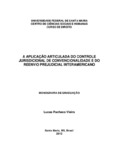| dc.contributor.advisor | Saldanha, Jânia Maria Lopes | |
| dc.creator | Vieira, Lucas Pacheco | |
| dc.date.accessioned | 2017-05-18T00:01:35Z | |
| dc.date.available | 2017-05-18T00:01:35Z | |
| dc.date.issued | 2012-12-19 | |
| dc.date.submitted | 2012 | |
| dc.identifier.uri | http://repositorio.ufsm.br/handle/1/2877 | |
| dc.description | Trabalho de conclusão de curso (graduação) - Universidade Federal de Santa Maria, Centro de Ciências Sociais e Humanas, Curso de Direito, RS, 2012 | por |
| dc.description.abstract | The effective interaction of international law with the national law is one of the major contemporary challenges in the field of international human rights law. In the case of the inter-American system of protection of human rights, the relationship between the Court of San José and the national courts is fundamental to the realization of the conventional rules and principles. Therefore, capable mechanisms are needed to promote an efficient and humanist jurisdictional collaboration. In the present work, two mechanisms that aims to strengthen the dialogue between the Inter-American Court of Human Rights and the magistrates of the States Parties to the Pact of San José are presented, in order to grant effectiveness to human rights also through the internal Judiciary Power. The mechanisms are the jurisdictional control of conventionality and the inter-american preliminary ruling. Besides being similar tools on the purpose of ensuring more effective protection of the rights of the human person and to foster a virtuous jurisdictional and jurisprudential dialogue, both can operate in a coordinated manner. It is this articulation the main theme of this monograph. It is the reflection work about the relationship between the duty to harmonize the national law with international norms held by the exercise of the jurisdictional control of conventionality, and the task of standardizing the interpretation and application of the inter-american corpus juris of human rights, enforced through the inter-american preliminary ruling. | eng |
| dc.language | por | por |
| dc.publisher | Universidade Federal de Santa Maria | por |
| dc.rights | Acesso Aberto | por |
| dc.subject | Interação | por |
| dc.subject | Mecanismos processuais | por |
| dc.subject | Controle de convencionalidade | por |
| dc.subject | Reenvio prejudicial interamericano | por |
| dc.subject | Articulação | por |
| dc.subject | Interaction | eng |
| dc.subject | Procedure mechanisms | eng |
| dc.subject | Control of conventionality | eng |
| dc.subject | Inter-american preliminary ruling | eng |
| dc.subject | Articulation | eng |
| dc.title | A aplicação articulada do controle jurisdicional de convencionalidade e do reenvio prejudicial interamericano | por |
| dc.title.alternative | The articulated application of the jurisdictional control of conventionality and the inter-american preliminary ruling | eng |
| dc.type | Trabalho de Conclusão de Curso de Graduação | por |
| dc.degree.local | Santa Maria, RS, Brasil | por |
| dc.degree.graduation | Curso de Direito | por |
| dc.description.resumo | A interação efetiva da ordem jurídica internacional com as ordens jurídicas nacionais é um dos maiores desafios contemporâneos no campo do direito internacional dos direitos humanos. No caso do sistema interamericano de proteção dos direitos humanos, a relação entre a Corte de San José e os juízes nacionais é fundamental para a materialização das regras e princípios convencionais. Para tanto, são necessários mecanismos processuais aptos a promover uma colaboração interjurisdicional eficiente e humanista. No presente trabalho, apresentam-se dois mecanismos que tem por objetivo o fortalecimento do diálogo entre a Corte Interamericana de Direitos Humanos e os magistrados dos Estados Partes no Pacto de San José, de modo a conferir efetividade aos direitos humanos também por meio do Poder Judiciário interno. Os mecanismos são o controle jurisdicional de convencionalidade e o reenvio prejudicial interamericano. Além de serem ferramentas similares quanto ao propósito de assegurar uma proteção mais efetiva dos direitos da pessoa humana e de fomentar um diálogo interjurisdicional e jurisprudencial virtuoso, ambos podem operar de forma articulada. É esta articulação o tema principal da presente monografia. É o trabalho de reflexão sobre as relações entre o dever de compatibilizar o ordenamento nacional com a normativa internacional, realizada através do exercício do controle jurisdicional de convencionalidade, e a tarefa de uniformizar a interpretação e a aplicação do corpus iuris interamericano de direitos humanos, cumprida por meio do reenvio prejudicial interamericano. | por |
| dc.publisher.unidade | Centro de Ciências Sociais e Humanas | por |


